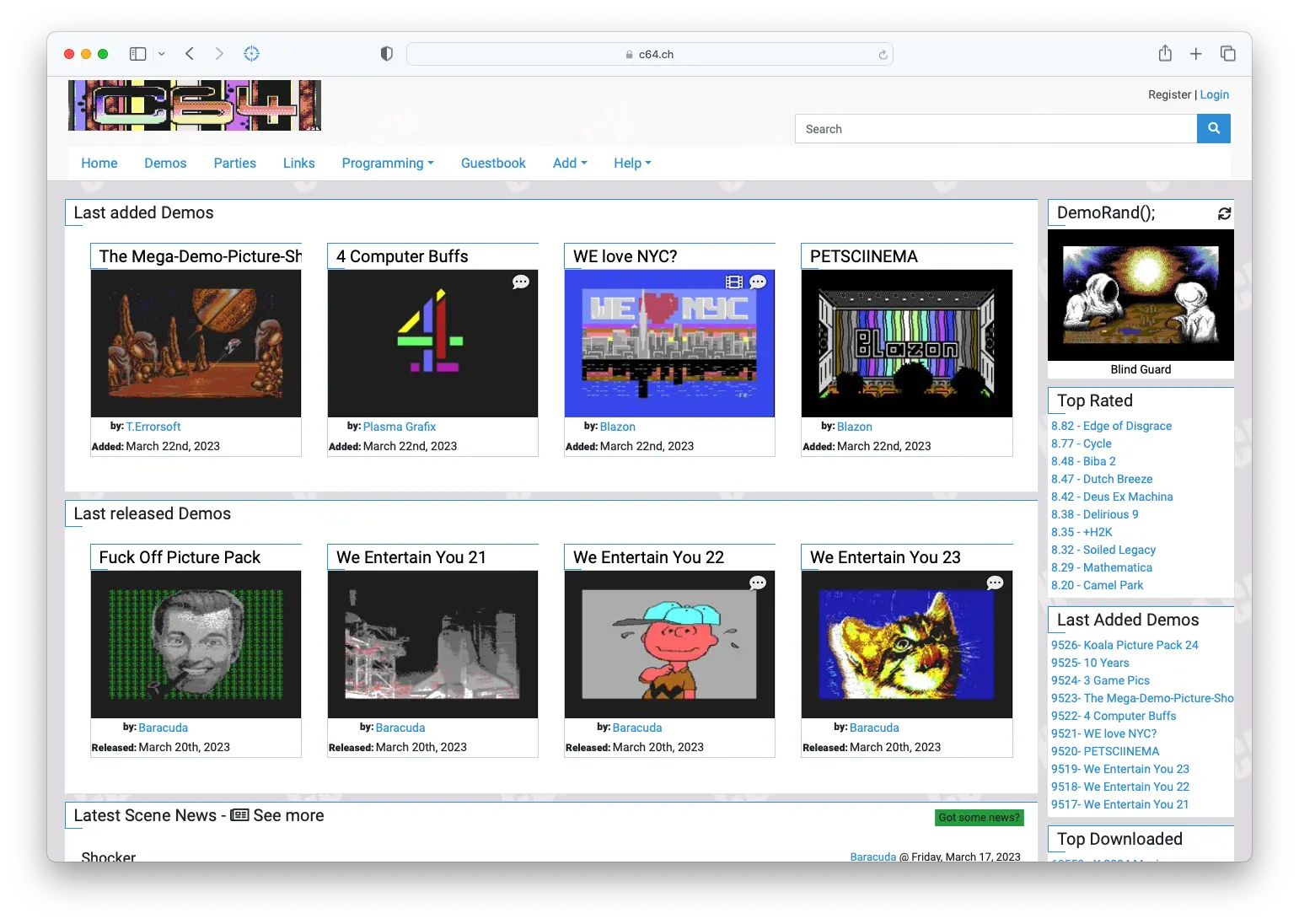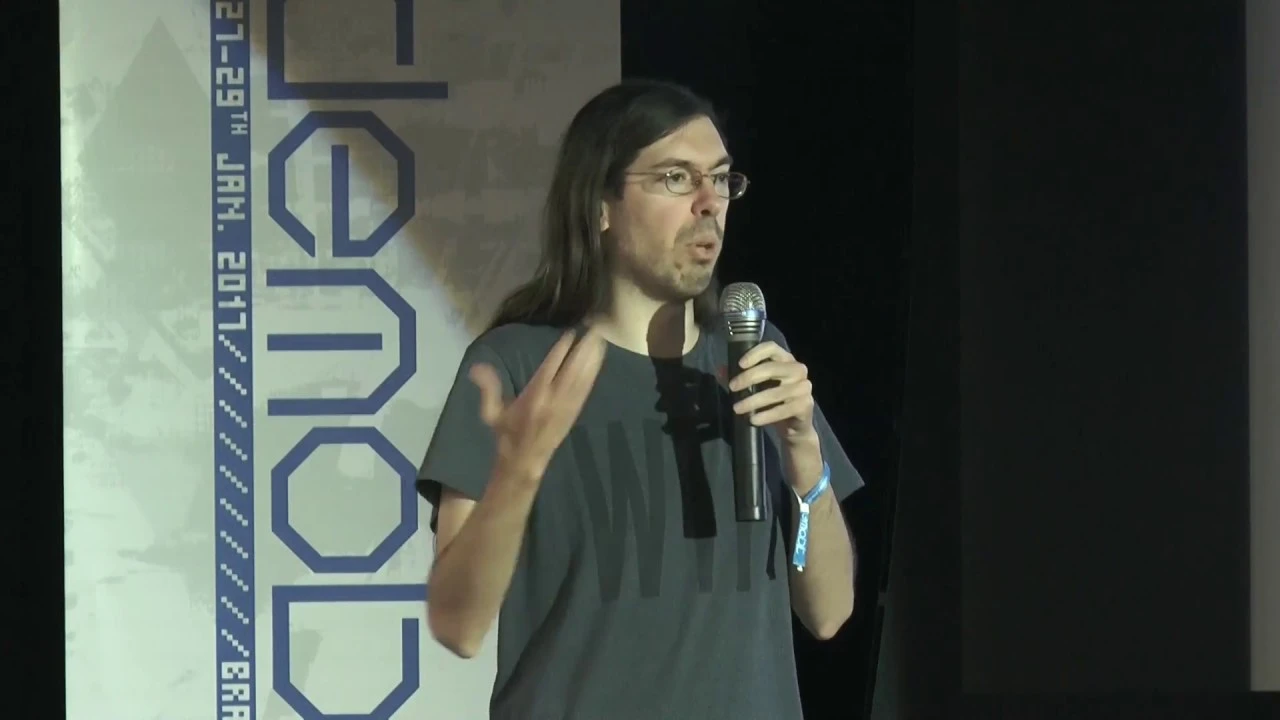Chapter IV
Archiving the World: The Good, the Bad, and the Innovative
No archive is perfect. Compromises have to be made and priorities set. The Amiga Demoscene Archive is no exception.
The two main demo archives for all systems are demozoo.org and pouet.net. These are active and constantly updated archives populated with demos from the different computer platforms. Most are released at demo parties.
Yet they differ from the A.D.A. because they feature demos from a multitude of different computer systems past and present beside the Commodore Amiga like the Commodore 64, the Atari 8-Bit line, the Sinclair ZX Spectrum, the Atari ST, as well as Linux and Windows, and even fantasy consoles that only exist in software and were never produced as hardware.[5]
The Commodore C64 Demo Archive
A better example of an active demo archive is c64.ch for the Commodore 64 community.

c64.ch
is a great example of a demo archive for a specific computer
system. It is dedicated to preserving and celebrating the
history of the Commodore 64.
The Swiss c64.ch is a collection of demos, cracktros, and intros created for the Commodore 64 computer.
In addition to the archive, c64.ch also features a forum where users can discuss Commodore 64-related topics, as well as a collection of hardware and software reviews, tutorials, and other resources for Commodore 64 enthusiasts.
In contrast to the Amiga Demoscene Archive, c64.ch provides a powerful search function that allows users to filter demos by category, group, and release date. This makes it easy to find specific demos or browse through the collection to discover new favorites. The archive is also continuously updated with new demos and releases, ensuring that users have access to the latest content from the Commodore 64 scene.
The Importance of scene.org
Like the other archives mentioned above, the Amiga Demoscene Archive integrates with scene.org. Login and registration can be handled through scene.org as well as hosting the files.
scene.org is a non-profit organization that provides a platform for the demoscene community to share and preserve their work. It provides the infrastructure to host large collection of demos, intros, and other productions created by demosceners from around the world. scene.org also features forums, news, and other resources for demosceners.

By providing the file archive,
scene.org
is an essential part of the demoscene infrastructure.
The organization also helps to promote the demoscene to a wider audience, raising awareness of this unique and vibrant subculture. Furthermore scene.org provides historical resources and support for demosceners.
Since more than twenty years, scene.org plays a critical role in preserving the history and culture of the demoscene. It is the "backbone" that holds together many of the other demo archives. These archives do not need to implement their own authentication system if they use scene.org for this purpose. This is a great example of how the community collaborates to the benefit of the greater demoscene. pouet.net and demozoo.org both reference the demo files hosted on the scene.org file archive.
What Makes a Good Demo Archive?
pouet.net, demozoo.org, c64.ch, and csdb.dk demonstrate which features a good demo archive should have.
A good demo archive should have a diverse and extensive collection of demos. It should include various media types such as images, descriptions, videos, executable files, and links to the source code repositories.
In addition, it should ensure that the demos are preserved in a way that maintains their original quality and format, making them accessible to future generations. Some forms might be more suited for easy access, like high-quality video captures, while others might be more suited for preservation, like disk images with functioning executable files from the original computer systems the demos were created for and of course source code. Accessibility is key. The archive should be easily usable by demo fans, creators, the general public, and researchers. An intuitive user interface with a search function and browsing capabilities should allow users to find, explore and download what they are looking for.
Finally, the actual content should include detailed metadata about each demo, such as information about the creators, title, date, medium, and any other relevant contextual data.

Particularly the Commodore Amiga 500 has many passionate fans
in the demoscene who are willing to spend their time voluntarily
to promote the demoscene and work on the archives.
The Invaluable Work of Volunteers
Not all archives necessarily require a team of technical experts to manage and maintain the collection, ensuring its ongoing viability and relevance. This is where volunteers come in. They can be fans of the demos, creators, or researchers. By its very nature, the demoscene is filled with technical experts who are willing to spend their time voluntarily. They can help with tasks such as uploading new demos, updating metadata, fixing broken links, and responding to user inquiries. Volunteers can also contribute by curating collections, writing articles, and organizing events. Their passion and dedication are essential to the success of the archive, as they bring valuable insights, expertise, and enthusiasm to the project.
In many cases, the organizers of demoparties voluntarily contribute by uploading the competition results and all the files for the submitted productions.
A good demoscene archive can only build a comprehensive and diverse collection through the efforts of volunteers and enthusiasts.
There are oh so many amazing volunteers!
A prominent figure is Gargaj. He is primarily known for his involvement with Conspiracy, a well-regarded Hungarian demogroup.
Gargaj is a talented programmer and musician, contributing to numerous high-quality demos over the years. He has also been a key organizer and host for demoscene events such as Function in Hungary and Revision in Germany, two of the scene’s largest parties. His work is highly regarded in the community for its technical skill and creativity. Gargaj has played a significant role in fostering the demoscene culture.
For nearly two decades, Gargaj was the moderator of pouet.net and its forums. In September 2024, he announced that he would be stepping down as admin of pouet.net in a post on pouet.net.

Some of the many many volunteers. This is a shot from the Evoke
2024 demoparty
And then there is Luisa, a talented and respected demoscener.
She is known primarily for her work as a visual artist and as one of the organizers of demoparties. She has contributed graphics and design elements to several high-profile demos, demonstrating her artistic skills in creating detailed and imaginative digital art. Luisa is part of the demogroups Rabenauge and Poo-Brain recognized for her distinctive style and has collaborated with various demogroups, helping produce visually striking works.
These are just two of the hundreds of volunteers!

PS presenting at a demoparty about the similarities between the
demoscene and the netaudio scene (Photo:
Demoscene & Netaudio
- Filipe "ps" Cruz - Demobit 2017)
Case Study: PS and the Demoscene
I'd like to highlight the contributions of a specific volunteer to illustrate the importance of their work in the demoscene community.
PS, also known as PSEnough, is a well-known figure in the demoscene community. His name in RL is Felipe Cruz and he is from Portugal (his real name is a matter of public record, this is not unwarrented disclosure). PSEnough is one of a dozen or so volunteers maintaining scene.org. He not only organizes demoparties like Inercia in Portugal but he also reports on the demoscene on his Youtube channel with dizzying frequency, sometimes even on a weekly basis. He is a passionate advocate for the demoscene and has made significant submissions to competitions at demoparties. I had the privilege of meeting him in person at Evoke 2022, the first post-pandemic edition of this series of demoparties, where PS organized and moderated the spectacular shader showdown.
Here's one of the demoscene reports by PS.
But this is not what I want to focus on. I want to highlight his work on the main demo archives, scene.org, pouet.net and demozoo.org. PS is a regular contributor to these platforms, where he uploads new demos, updates existing entries, and provides valuable information about the demoscene community. His work helps to ensure that these archives remain up-to-date and relevant to demosceners and enthusiasts around the world.
Here is one of PSEnough's sessions editing demozoo.org (and by showing how its done, encouraging others to do the same).
PS has been instrumental in ensuring that these databases are regularly updated and maintained. His work has helped preserve the history and culture of the demoscene, making it accessible to a wider audience and ensuring that it remains a vibrant and active community.
I don't think PS's great diligence is typical of everyone in the demoscene. Most volunteers contribute far less, and only a few match or exceed his level of commitment. However, his contributions to the demoscene community demonstrate the power of volunteers in preserving and promoting digital art and culture. Their dedication and passion are essential to the success of demo archives like pouet.net and demozoo.org. It is the work of PS and his peers that ensures the demoscene remains a vital part of the digital art world.
Footnotes
[5]
A fantasy console is a type of software platform that is
designed to emulate the limitations of retro game consoles from
the 1980s and 1990s. Examples are
PICO-8,
TIC-80
and
LowResNX. These platforms are
used for creating retro-style games and
demos with pixel art graphics, limited color palettes, and
simple sound effects. Unlike traditional game consoles, which
were physical hardware devices, fantasy consoles are purely
software-based and run on modern computers or mobile devices.
» Back [5]